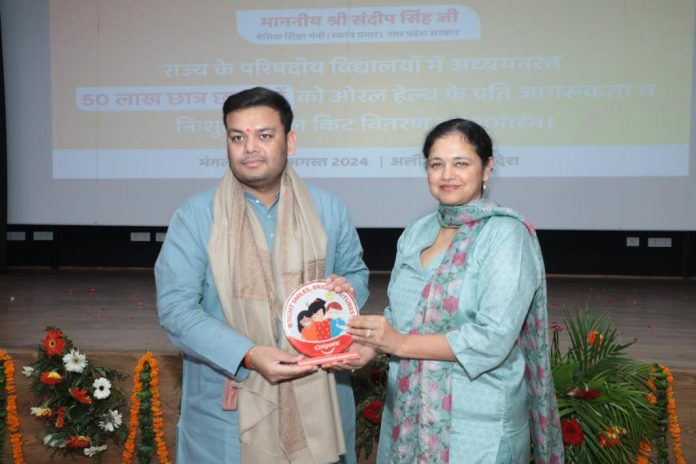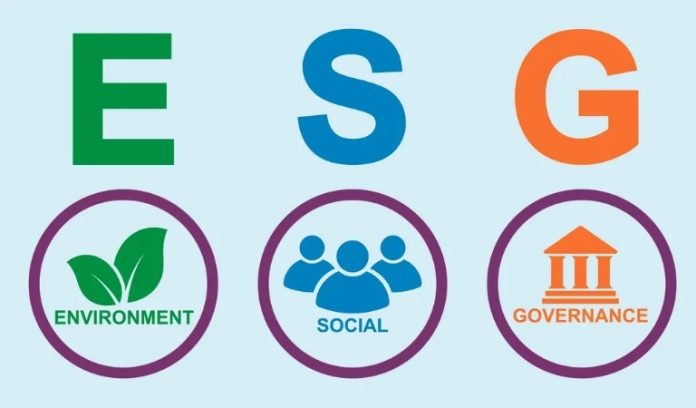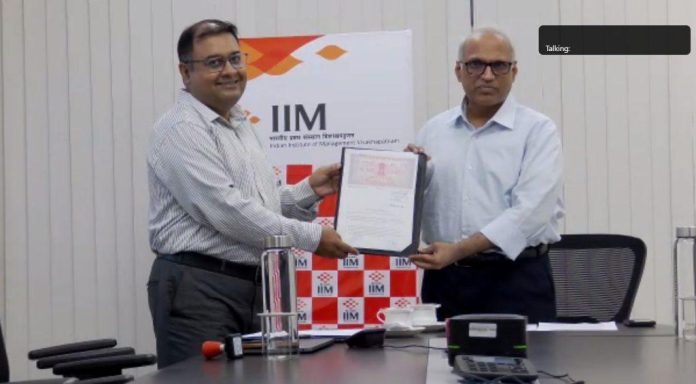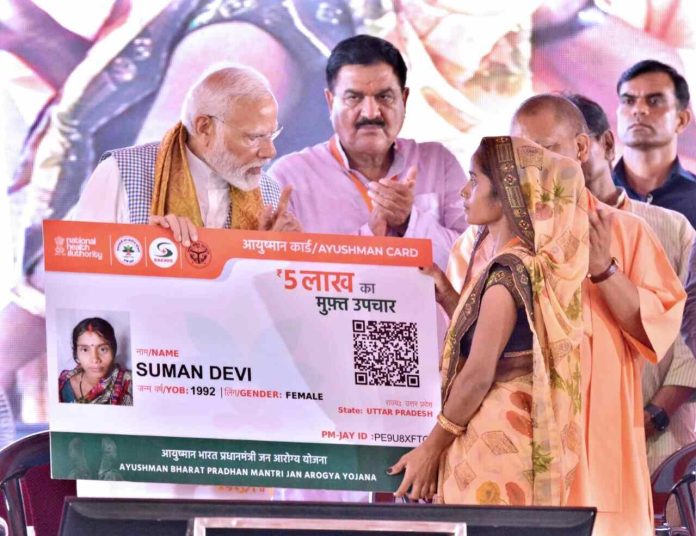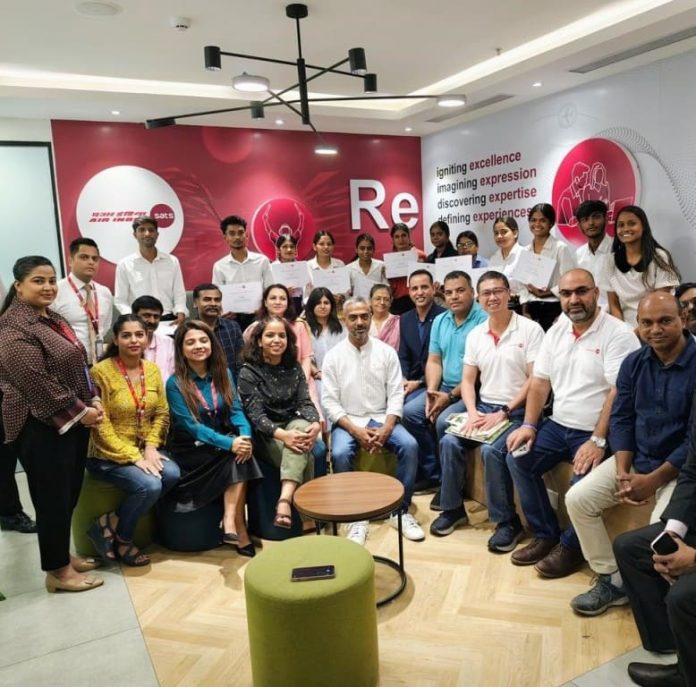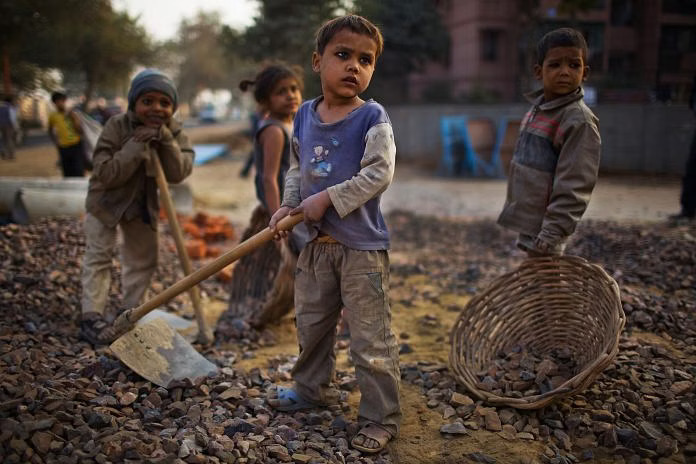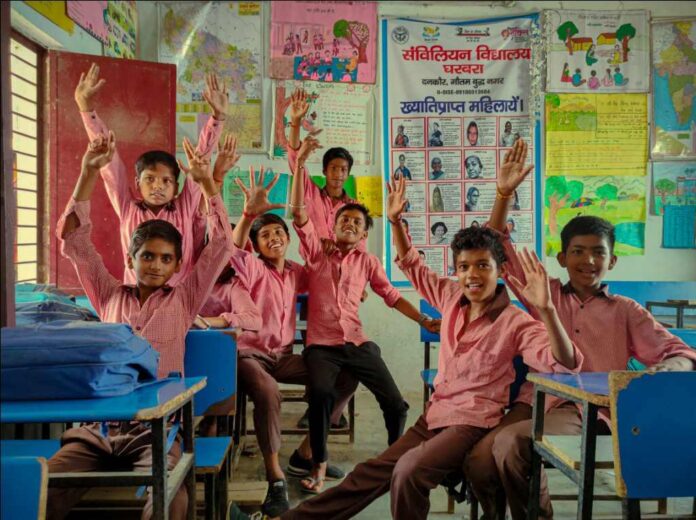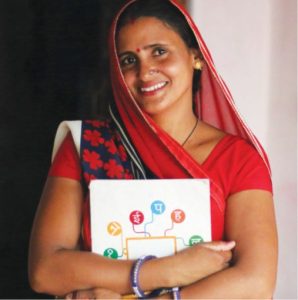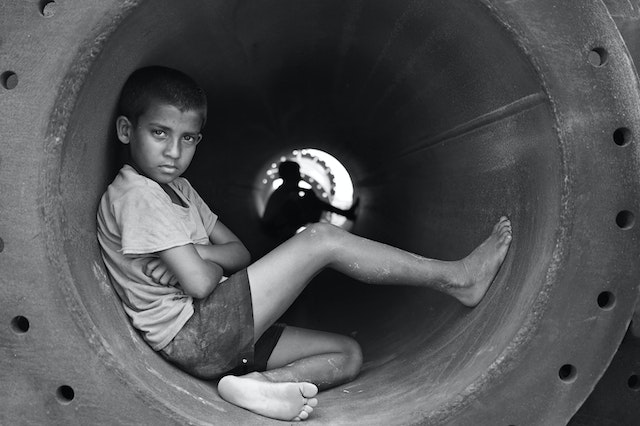Oral hygiene brand’s partnership with Uttar Pradesh Government aims to impact 50 Lakh Children by 2026
Aligarh, Uttar Pradesh: In its ongoing efforts to enhance Oral Health Education, Colgate has signed a Memorandum of Understanding (MoU) with the Government of Uttar Pradesh to bring its flagship program, Colgate Bright Smiles, Bright Futures® (BSBF) to the children across the state. Through this collaboration, Colgate aims to intensify the outreach of its BSBF in-school program in Uttar Pradesh by committing to reach 50 lakh students in 2 years.
This vital initiative was inaugurated, with the first phase of impacting 50 lakh children by 2026, in the esteemed presence of Shri Sandeep Singh, Honourable Minister of State (Independent Charge) for Basic Education, GoUP, Dr. M.K. Shanmuga Sundaram, Principal Secretary, Department of Basic Education, GoUP and Smt Prabha Narasimhan, MD & CEO of Colgate-Palmolive (India) Limited.
Colgate’s Bright Smiles, Bright Futures®, that translates into ‘Ujwal Muskaan, Ujwal Bhavishya’ in Hindi is a carefully designed initiative focused on right Oral Care habits, raising awareness about tobacco prevention, and promoting good nutrition for Oral Health among school children aged 6 to 15 years.
The program focuses on five critical missions: the right way of brushing, importance of brushing twice daily, replacing one’s toothbrush every three months, abstaining from the use of tobacco, and embracing nutritious food choices. Supplementary materials including dental kits, brushing calendars, teacher training guides, and certificates will arm children and educationists with essential lifelong knowledge.
Addressing the audience at the launch ceremony Shri Sandeep Singh, Honourable Minister of State (Independent Charge), Basic Education, Government of UP said, “I am delighted to be joined by Ms. Prabha Narasimhan, the Colgate team, teachers and students today for this event focused on the important cause of Oral Healthcare. We believe that this is fundamental to overall well-being, and by partnering with Colgate, we aim to bring Oral Care Education to students and inculcate the importance of Oral Hygiene via the curriculum and the libraries in all our schools across the state.”
Addressing the partnership, Smt Prabha Narasimhan, MD & CEO of Colgate-Palmolive (India) Limited, added, “Our vision to enhance Oral Care awareness and education in India is unwavering, supported by our advancements in scientific research. We are deeply honored to partner with the Government of Uttar Pradesh and are committed to engaging with all 1.93 crore children in the state. With this, we will further propel our mission to create meaningful, positive change for children in the region. Our Colgate Bright Smiles, Bright Futures® will continue to champion healthy smiles”.
Since its inception in 1976, the Colgate Bright Smiles, Bright Futures® program has positively impacted over 176 million children across India with the knowledge of good Oral Health Habits.
The inauguration ceremony hosted in Aligarh officially marked the commencement of this program, and it also witnessed the esteemed presence of Ms. Shilpashree Muniswamappa, Director – ESG & Communications at Colgate-Palmolive (India) Limited, Shri. Ruchir Bhatnagar, Senior Director- Customer Development at Colgate-Palmolive (India) Limited, Shri Bhomik Shah, Trustee, BharatCares, Shri. Vikas G IAS, District Magistrate, Aligarh, GoUP, Shri. Sanjiv Suman IPS, Senior Superintendent of Police, Aligarh, GoUP, Shri. Anil Parashar, MLA, Shri. Ravendra Pal Singh, MLA, Shri. Raj Kumar Sahyogi, MLA, Shri. Manvendra Pratap Singh, MLC, Shri. Krishnapal Singh, BJP President, Aligarh, Smt. Vijay Singh, Zila Panchayat Adhyaksh, Shri. Prashant Singhal, Mayor, Aligarh and Shri. Rakesh Singh, Basic Shiksha Adhikari, Aligarh, GoUP.
Disclaimer: This media release is auto-generated. The CSR Journal is not responsible for the content.
Sustainability reporting in the era of ESG: Best practices and value of ESG assurance
A timeline of sustainability reporting: from voluntary to mandatory
It’s interesting to look at the evolution of sustainability reporting. What started decades ago as voluntary reporting by a select few corporates in service industry who had ADR/GDRs, has now evolved to mandatory reporting for listed companies and customer related pressure for reporting in case of unlisted companies.
In terms of evolution, in the 1970s, environmental reporting took root in Europe and North America, as companies voluntarily disclosed pollution and waste created from their manufacturing activities. The 1990s ushered in Triple Bottom Line reporting, integrating social, environmental, and economic performance. The founding of the Global Reporting Initiative (GRI) in 1997 solidified sustainability reporting frameworks. By the 2000s, growing awareness prompted widespread adoption, with GRI’s guidelines establishing standardized practices. From 2015, alignment with UN SDGs intensified focus on materiality and stakeholder engagement.
Since 2020, heightened investor and stakeholder interest propelled ESG factors into the spotlight, driving transparency and mainstream integration of ESG risk management. India also followed a similar path and incorporated governance reporting for listed companies and then in the last couple of years regulators have introduced mandatory ESG reporting and even reasonable assurance.
There were multiple global failures which prompted regulations to take accelerate and start strengthening reporting frameworks in the last two decades it has been evident that Environment and Social factors are equally important and can cause severe damages to the stakeholders of the companies in medium term or longer term.
ESG and financial impact
The growing awareness and evidence that ESG factors can have a material financial impact meant that investors globally started incorporating ESG into their investment decision making. Numerous studies have shown a correlation between strong ESG performance and financial performance over the long term. Companies which better manage ESG tend also be more resilient, attract better talent, and enjoy greater customer loyalty. The large market cap companies in India started embracing sustainability into their practices earlier than the mid and small cap companies as most of them play a significant part in global supply chains.
The framework for ESG reporting
There are key frameworks adopted by companies globally and including India. Some of the notable ones and widely used are Global reporting initiative (GRI) which mainly focusses on comprehensive sustainability reporting, and it contains universal standards across industries. GRI emphasizes stakeholder inclusiveness and materiality. The task forces on climate-related financial disclosures (TCFD), focusses on climate related financial disclosures and covers the companiesgovernance, strategy, risk management, and metrics. The Financial stability board(FSB) has recently officially transferred the responsibility from TCFD to the International Financial Reporting Standards Foundation (IFRS).
The sustainability accounting standards board (SASB) focusses on financially material sustainability information. In India, SEBI introduced the Business Responsibility and Sustainability Reporting (BRSR) which focusses on sustainability reporting for Indian companies and the principles are aligned with the National Guidelines on Responsible Business Conduct (NGRBC). BRSR is now mandated by SEBI for the top 1000 listed companies in India, covering essential metrics and principles.
Multiple frameworks and evolving regulations might create a dilemma for companies in India. The companies need to understand regulatory requirements and ensure they comply with mandatory regulations such as SEBI’s BRSR. Besides that the companies should assess its key stakeholder needs and prioritize various aspects material to their sector. As of 2022, 68% of the leading 5800 global companies use GRI standards and is usually the starting point for majority of the companies. Aligning with international standards is important as companies are part of global supply chain and it will help the company attract global investors.
ESG Assurance
ESG assurance involves a third-party verification of a company’s sustainability disclosures, which enhances the credibility of the reported data. Assurance of non-financial data allays any greenwashing concerns stakeholders may have. This also identify gaps and areas of improvements in a company’s ESG practices and having an independent reviewer is critical for a non-biased review. Last year, SEBI mandated companies to undergo a reasonable assurance of their BRSR core disclosures and this includes limited assurance of their value chain. By FY 2026-27, all the Top 1000 listed companies by market cap and its value chains are covered under this framework. For Indian companies operating on a global scale or seeking international investments, ESG assurance aligns their reporting with some of the global standards and expectations.
Conclusion
In conclusion, the journey of sustainability reporting, from voluntary to mandatory, underscores its pivotal role in modern corporate governance. The recent surge in ESG (Environmental, Social, Governance) awareness has propelled sustainability reporting into the spotlight, emphasizing the critical link between ESG performance and financial resilience.
For companies in India, navigating the array of frameworks and evolving regulations presents a challenge. However, embracing mandatory reporting requirements like BRSR, while aligning with global standards such as GRI, ensures compliance and fosters investor confidence. Moreover, the introduction of ESG assurance by SEBI provides an additional layer of credibility, enhancing the reliability of reported data and addressing stakeholders’ concerns.
Views of the author are personal and do not necessarily represent the website’s views.

Ramnath Iyer is the Co-founder and CEO of ESGDS. He has a proven track record as an operations and technology leader. With over 27 years of experience in the BFSI (Banking, Financial Services, and Insurance) sector, he possesses a wealth of knowledge in fintech operations, with a significant focus on Environmental Social Governance (ESG) Assurance and ESG Risk Assessments. Throughout his illustrious career, Mr. Iyer has consistently demonstrated his ability to drive business transformation, enhance scale and deliver substantial shareholder value.
MoU signed to launch Case Conference on Responsible Innovations and Sustainability Practices
Visakhapatnam, India: Indian Institute of Management (IIM) Visakhapatnam and TimesPro’s initiative – ET Cases, signed a Memorandum of Understanding (MoU) to collaborate on the Case Conference on Responsible Innovations & Sustainability Practices (CRISP). The joint initiative aims to advance responsible management education and sustainable practices aligned with global standards and Sustainable Development Goals (SDGs).
The virtual signing ceremony was attended by key figures including Prof. M. Chandrasekhar, Director, IIM Visakhapatnam, Anish Srikrishna, CEO, TimesPro, Dr. Amit Chakrabarti, Head – Centre for Responsible Management Education, IIM Visakhapatnam and Sunil Sood, Chief Growth and Partnership Officer, TimesPro. CRISP is scheduled for December 13-14 and seeks to bring together academicians, industry leaders, policymakers and students for discussions on sustainable practices, innovations and challenges. The conference will focus on two important aspects, i.e., Innovation and Sustainability, and will feature six thematic tracks aligned with the United Nations’ Sustainable Development Goals (SDGs).
On the occasion, Prof. M. Chandrasekhar, Director, IIM Visakhapatnam said, “We take immense pride in collaborating with TimesPro to disseminate high-quality education that is both accessible and affordable. The Case Conference on Responsible Innovations & Sustainability Practices enhances our joint efforts in knowledge generation, offering a platform for showcasing sustainability innovations. This initiative provides a splendid platform for participants to showcase exemplary innovations in sustainability. At IIM Visakhapatnam, we prioritise environmental and social contributions alongside economic value This conference, embedding sustainability principles across our programmes, will significantly influence management education and support a broad spectrum of industry and academia stakeholders. These case studies will form a remarkable repository, marking a pioneering endeavour in this domain.”
Echoing Prof Chandrasekhar, Anish Srikrishna, CEO, TimesPro said, “We are delighted to collaborate with IIM Visakhapatnam in advancing responsible management education through the Case Conference on Responsible Innovations & Sustainability Practices. Institutions must adopt a holistic approach to sustainability for lasting impact. As sustainability has become a board-level priority, this is an opportune moment to develop essential reference materials for educational purposes for future generations. At TimesPro, we focus on future-centric sustainability and our team at ET Cases is diligently constructing a repository of pivotal learning tools. This initiative, which seamlessly integrates the sustainability agenda through CRISP is truly commendable.”
The CRISP conference will address critical global challenges by focusing on sustainability and responsible innovations. It will feature six major thematic tracks aligned with the United Nations’ Sustainable Development Goals (SDGs): Sustainable Business Models and Practices, Climate Action and Environmental Stewardship, Social Innovation and Inclusive Development, Health, Well-being, and Safety, Urbanisation and Smart Cities, and Governance, Policy, and Partnerships. The conference will include keynote addresses from eminent speakers from academia and industry, panel discussions, case study presentations, networking sessions, and poster sessions.
Faculty members from Central or State Government institutions, as well as those from institutions ranked in the top 50 by NIRF, are eligible to submit cases at the conference. Additionally, PhD scholars, MBA students, working professionals, NGO representatives, and industry members are welcome to submit cases, provided they have at least one faculty member as a co-author.
Disclaimer: This media release is auto-generated. The CSR Journal is not responsible for the content.
कॉरपोरेट अस्पतालों में हो रहा आयुष्मान कार्ड धारकों का इलाज
प्रधानमंत्री नरेंद्र मोदी सरकार की आयुष्मान भारत योजना का लाभ गरीब और जरूरतमंदों को बड़े पैमाने पर हो रहा है। अगर हम बात करें उत्तर प्रदेश को तो आयुष्मान कार्ड धारक सबसे ज्यादा यूपी में हैं। उत्तर प्रदेश की गरीब जनता और जरूरतमंद को योजना का लाभ देने के लिए योगी सरकार 5 करोड़ से अधिक आयुष्मान कार्ड बनाकर पूरे देश में अव्वल बनी है। Ayushman Card धारक मरीजों को गंभीर से गंभीर बीमारी में आसानी से इलाज मिल रहा है। उन्हे यह इलाज बड़े-बड़े कॉरपोरेट मेडिकल संस्थानों में एक्सपर्ट डॉक्टर्स द्वारा मुहैया कराया जा रहा है। अब तक 2500 करोड़ से अधिक की धनराशि गंभीर बीमारी वाले 6 लाख से अधिक मरीजों के इलाज में खर्च की जा चुकी है। इतना ही नहीं दूसरे Uttar Pradesh के Ayushman Card धारक भी प्रदेश की बेहतर स्वास्थ्य सेवाओं का लाभ ले रहे हैं।
गरीब और जरूरतमंद मरीजों का आयुष्मान कार्ड से हो रहा है उपचार
The CSR Journal से ख़ास बात करते हुए उत्तर प्रदेश के प्रमुख सचिव हेल्थ एंड फॅमिली वेलफेयर पार्थ सारथी सेन शर्मा ने बताया कि गरीब जनता को आयुष्मान भारत का लाभ देने के लिए युद्धस्तर पर आयुष्मान कार्ड बनाए जा रहे हैं। इसी का नतीजा है कि उत्तर प्रदेश में 5 करोड़ 11 लाख 72 हजार 647 आयुष्मान कार्ड धारक हैं। जिन्हे प्रदेश के 5,669 अस्पतालों द्वारा इलाज मुहैया कराया जा रहा है। इनमें 2948 सरकारी और 2721 प्राइवेट अस्पताल शामिल हैं। इतना ही नहीं प्रदेश के कारॅपोरेट अस्पतालों मेें भी कार्ड धारकों को इलाज मिल रहा है। इसमें अपोलो, मेदांता, यशोदा, रिजेंसी, टेंडर पॉम जैस बड़े कॉर्पोरेट अस्पताल शामिल हैं। योजना के तहत अब तक 45,19,375 मरीजों के इलाज में 7040 करोड़ रुपये खर्च किये जा चुके हैं। प्रमुख सचिव ने बताया कि उत्तर प्रदेश कार्ड बनाने के मामले में विगत कई वर्षों से पूरे देश में नंबर वन राज्य बना हुआ है, जबकि दूसरे स्थान पर मध्य प्रदेश है, जहां 4 करोड़ 3 लाख कार्ड बनाए गए हैं। वहीं तीसरे स्थान पर बिहार है, जहां 3 करोड़ 26 लाख कार्ड बनाए गए हैं।
5600 से अधिक अस्पतालों में आयुष्मान कार्ड के जरिए हो रहा उपचार
The CSR Journal से बातचीत करते हुए Sangeeta Singh, Chief Executive Officer of State Agency for Comprehensive Health and Integrated Services- Ayushman Bharat ने बताया कि आयुष्मान कार्ड धारक मरीजों की गंभीर से गंभीर बीमारी का भी आसानी से इलाज किया जा रहा है। उन्होंने बताया कि अब तक 2,557 करोड़ से टर्शियरी केयर के तहत 6,98,831 मरीजों को इलाज उपलब्ध कराया गया है। इसमें 66,513 हृदय रोगियों का इलाज किया गया। इनके इलाज में 684 करोड़ रुपये खर्च किये गये। वहीं दूसरे राज्य के 1,79,141 मरीजों ने प्रदेश की बेहतर स्वास्थ्य सेवाओं का लाभ लिया। इनके इलाज में 491 करोड़ रुपये खर्च किये गये जबकि प्रदेश के बाहर रहने वाले 3,05,264 प्रदेशवासी मरीजों ने दूसरे प्रदेश में इलाज कराया। इनके इलाज में 821 करोड़ रुपये खर्च किये गये।
कॉरपोरेट अस्पतालों में में जमकर होता है सीएसआर
गरीब जब भी बीमार होते है उनके इलाज के लिए सिर्फ एक ही विकल्प होता है वो है सरकारी अस्पताल लेकिन सरकार की कई ऐसी सुविधाएं है जिनका फायदा उठाकर हम कॉरपोरेट और बड़े अस्पतालों में हम अपना इलाज करवा सकते हैं। इसमें सीएसआर की भूमिका अहम होती है। कॉरपोरेट हाउसेस अपना बड़ा सीएसआर इन अस्पतालों में खर्च करते है ताकि गरीबों का इलाज हो सके। अपोलो, मेदांता, यशोदा, रिजेंसी, टेंडर पॉम जैस ये बड़े कॉर्पोरेट अस्पताल (Corporate Hospital) हैं जहां पर सीएसआर खर्च किया जाता है।
Airport services management company to train and employ 14 Orphan Youths for their Cargo Terminal at Noida International Airport
Noida, India: Air India SATS Airport Services Pvt Ltd (AISATS), a leading airport services management company in India, has pioneered an innovative skill development program for orphaned youth. This ground-breaking initiative, an industry first, establishes a new benchmark in the sector. The initiative saw 14 candidates from the Jagshanti Udayan Care NGO’s After Care Unit in Greater Noida graduate from a comprehensive 40-day vocational training program. These talented individuals are now set to begin their careers at the AISATS Cargo Terminal at Noida International Airport, marking a significant milestone in their lives and for the industry.
This free-of-cost program underscores AISATS’s commitment to empowering underprivileged youth and represents a paradigm shift in the aviation sector’s approach to community development and workforce preparation. By aligning corporate social responsibility with the industry’s growing need for skilled workers, AISATS has created a mutually beneficial model. AISATS has signed a MoU with Invest UP for Know How Training during the Global UP Investor Summit and already conducted a job fair at Maharajganj District, UP, and selected more than 500 candidates for its various airports across India with the help of Invest UP. The UP Government officials have also helped AISATS in organizing this initiative and selecting candidates from the orphanages.
The program’s success paves the way for future expansions, with AISATS planning to extend similar opportunities to more underprivileged youth across its stations. This innovative approach not only addresses the immediate needs of orphaned youth but also contributes to the long-term development of a skilled aviation workforce.
Sanjay Gupta, CEO at AISATS, stated, “This initiative embodies our core values of inclusivity, empowerment, and community support. By equipping these young individuals with valuable skills and job opportunities, we’re not just providing employment – we’re cultivating hope, dignity, and self-reliance. Our program bridges the gap between underprivileged youth and meaningful career opportunities in aviation. We plan to expand this initiative across all our airports and upcoming projects, ensuring our growth aligns with community betterment and building an ecosystem conducive to creating skilled employment opportunities within the aviation sector.”
The program, offered entirely free of cost, demonstrates AISATS’s commitment to empowering underprivileged youth. During the graduation ceremony, participants were awarded certificates and gifts, celebrating their newly acquired expertise and marking the start of their careers in the aviation industry.
As these 14 graduates prepare to join the workforce at AISATS’ integrated cargo terminal (ICT) at Noida by its Commercial Operation Date (COD), their success sets a new benchmark for sustainable and impactful corporate social responsibility in the industry, potentially inspiring similar initiatives across the sector.
Disclaimer: This media release is auto-generated. The CSR Journal is not responsible for the content.
Stree-Leads initiative launched to promote women’s leadership in India’s Private Sector
Mumbai, India: EdelGive Foundation, in its continued effort to drive social change, enable marginalised communities, and strengthen the systems within the development sector, recently launched its flagship initiative, Stree-Leads, aimed at accelerating women’s advancement into leadership roles within India’s private sector. This initiative underscores EdelGive Foundation’s commitment to fostering women’s economic empowerment and supporting grassroots NGOs dedicated to uplifting vulnerable communities.
As a part of this initiative, some women leader who have joined hands with EdelGive Foundation include Aditi Jha, Director & Country Lead, Legal & Government Affairs, LinkedIn, Priti Srivastava, Mentor, Advocacy, Reliance Industries Limited, Aparna Upaluri, former COO, Tata Trusts and Vijaya Balaji, Founding Partner, Social Lens Consulting.
Naghma Mulla, CEO, EdelGive Foundation, said, “Every woman who has navigated her way to a leadership position has a story to tell. Our collaboration with Josh Talks hands them the mic in the hope that lessons learned from their journeys will guide and inspire more women towards taking up the mantle of leadership, encouraging them to brave the path forward across sectors and geographies.
EdelGive believes that enabling women to reach financial independence and their full potential is a collective social effort, reinforced across policy frameworks, workplaces and homes. Through Stree-Leads, EdelGive is focusing on the women professionals in the Indian corporate sector, paving the way for them to advance in their careers and attain leadership roles”.
Launched in 2023, Stree-Leads is poised to amplify the significant impact women create in leadership roles and accelerate their progression by identifying and promoting pathways to leadership. Guided by the government’s mandate for women-led development and endorsed by Hon’ble G20 Sherpa, Mr. Amitabh Kant, Stree-Leads unveiled its groundbreaking report, ‘A Study on Pathways to Leadership for Women in the Finance and Economic Sectors,’ in December 2023. This study provides critical insights into the challenges women leaders face and offers strategic recommendations for corporate and government sectors to enhance women’s leadership in the private sector.
The initiative has been meticulously designed to:
Develop a role-model mechanism: Inspire women professionals to pursue leadership positions by showcasing successful female leaders.
Build creative interventions: Facilitate dialogues and create actionable pathways for women to ascend to leadership roles.
Encourage allyship: Foster collaboration with key corporates and stakeholders to build a synergistic ecosystem that supports women’s leadership.
Further, the initiative will focus on sectors with high potential for impact, particularly BFSI (Banking, Financial Services, and Insurance), Tech, and Social Enterprise/Philanthropy sectors. By leveraging the insights from its comprehensive study, Stree-Leads aims to create an environment where women can thrive and lead.
EdelGive Foundation has been a transformative force in India’s development sector for over 13 years. By supporting over 150 organizations across 111 districts in 14 states, EdelGive has championed causes like quality education, climate resilience, social and economic empowerment of women, and resilient livelihoods. Through initiatives like UdyamStree, which empowered 3,000 women in rural Maharashtra and Rajasthan by promoting rural women’s entrepreneurship, EdelGive has consistently demonstrated its dedication to creating sustainable impact.
Disclaimer: This media release is auto-generated. The CSR Journal is not responsible for the content.
Advocates for Children’s Rights Urge Improved Budget Allocation for Early Childhood Development
New Delhi, India: Alliance for Right to ECD hosted a webinar that analyzed the Union Budget 2024-2025 from the perspective of Early Childhood Development (ECD). Alliance for Right to ECD in collaboration with, Right to Education Forum, Campaign Against Child Labour, and the Forum for Crèches and Children’s Services (FORCES) have been highlighting the issues around quality ECD and adequate budgetary allocations required for it. The webinar evaluated and brought forth critical insights on the budget’s alignment with early childhood development. The discussion encompassed health, education, care, and nutrition—areas that require a multisectoral approach and convergence of funds.
The speakers highlighted the low budgetary allocations to the social sector and their impact on ECD. Shortage of skilled human resources and quality infrastructure were identified as major factors that lead to inadequate access to early childhood services for underserved communities. While lauding the New Education Policy (NEP) and Mission Saksham Anganwadi as significant developments, the speakers emphasized increased funding and robust policy measures as vital measures to effectively provide universal ECD facilities.
Prof. Venita Kaul, Steering Committee Member of Alliance for Right to ECD, highlighted the progress made in ECD. “Early childhood was given priority in NEP 2020 for the first time operationally, integrating it into the school curriculum. The formation of the national curriculum framework and the introduction of schemes like Mission Saksham Anganwadi and Poshan 2.0 reflect the government’s commitment to this sector. The National Institute of Public Cooperation and Child Development’s frameworks, Adharshila and Navchetna, further showcase this commitment.”
Protiva Kundu, addressed the challenges in public spending on social sectors. “Despite an increase over the past decade, public spending on social sectors remains low at around 7.8% of GDP. This inadequacy has led to systemic weaknesses in programs for young children, including shortages in skilled human resources and quality infrastructure. The government must prioritize a sustainable quality childcare system and address data gaps to provide adequate financing.”
The webinar also featured a panel discussion with experts including Chirashree Ghosh, National Coordinator of FORCES (Forum for Creches and Childcare Services (FORCES), Dipa Sinha, Development Economist. The panelists advocated for increasing the number of creches for model development and the need to strengthen ECD provisions in the country by focusing on services for both, children and their families.
Chirashree Ghosh emphasized the need for equitable resource distribution. “While 17,000 creches were chosen for model development, the remaining creches also deserve similar treatment. The budget allocation disparities raise questions about the universalization of quality services for all children. State budgets must now focus on addressing these gaps.”
Dipa Sinha stated the critical role of state intervention in improving childcare services “There is no doubt that state intervention is crucial for enhancing services for children. Early Childhood Development (ECD) is not confined to a single ministry or department; it requires a coordinated approach across multiple services benefiting both children and their households. Although we’ve seen some progress in areas like national nutrition campaigns over the past decade, ECD still does not receive the priority it deserves. To address this, we must advocate for a substantial increase in the budget for children, reflecting the rise in GST and inflation, to ensure that ECD schemes are adequately funded and prioritized.”
Arbind Singh from NASVI (The National Association of Street Vendors of India) said “There is a need to align governance with the policy. While there is unspent money for street vendors on one hand on the other hand eviction of street vendors is still burning concern.”
The webinar underscored the critical need for improved policy and budgetary prioritization to create an enabling environment for young children and their families. The coalition of organisations continues to advocate for comprehensive strategies to enhance early childhood development services and ensure equitable access for all children.
Disclaimer: This media release is auto-generated. The CSR Journal is not responsible for the content.
Complete CSR Report of Tata Consultancy Services (TCS) in India FY 2023-24
Tata Consultancy Services, globally referred to as TCS is India’s largest software and IT services company. A part of India’s largest multinational business Tata group, TCS has over 420,000 of the world’s best trained consultants in 50 countries across major continents.
Talking about their corporate social responsibility, TCS gives special attention to STEM (Science, Technology Engineering, and Mathematics) and rural education. In keeping with the philosophy of Tata Group, the company channelizes its best resources to improve literacy level and train the innovators and tech geniuses of tomorrow. Other areas of focus for social change include marine conservation, health and sanitation.
TCS invests in addressing the most pressing needs of the community through various CSR initiatives and programs focused on education, skilling, employment, and entrepreneurship, aligned with the UN Sustainable Development Goals (UN SDGs). With a focus on bridging gaps in access to opportunities, TCS also invests in social innovation and community projects targeted the poorest sections of society, and supports programs addressing basic health and wellness, water sanitation and hygiene, conservation, and disaster relief efforts.
In the FY 2022-23, Tata Consultancy Services had spent Rs 783 crore on corporate social responsibility which has gone up to Rs 827 crore in FY 2023-24.
CSR Policy of TCS in India

Tata Group Founder Jamsetji Tata’s words sum up the basic tenet of corporate social responsibility at the Tata companies: “In a free enterprise, the community is not just another stakeholder in our business, but it is in fact, the very purpose of its existence.” In line with this thought, TCS CSR programs are all about sustainable well-being.
Coming from the Tata Group legacy, which gives utmost respect to the community, environment and employees, TCS in India has a strong commitment to corporate social responsibility. A recent example of its concern for employees is how, when most other companies were either laying off their workforce or imposing salary cuts during the COVID-19 pandemic, this tech company announced a salary hike for its employees across all levels, making TCS the first IT firm in India to declare an increase in pay during the pandemic.
TCS’ community development programmes across the world include health and wellness, biodiversity, education, STEM, digital literacy and skill development. CSR of TCS also includes other activities like disaster management.
Talking about Corporate Social Responsibility, TCS mentions in its CSR policy that their ‘vision’ is to “Empower communities by connecting people to opportunities in the digital economy” and their ‘mission’ is to “Build equitable, sustainable, and inclusive pathways to opportunities for all – especially youth, women, and marginalized groups.”
The company also mentions that their major objectives to engage with communities include “Creation of employment, entrepreneurship and livelihood opportunities for youth and marginalized members of the community and development of 21st century skills through education and skilling.” They also aim to “Support basic health and wellness; water, sanitation, and hygiene need of communities- especially those that are marginalized.”
CSR Committee
The CSR committee comprises N Chandrasekaran (Chairman, Non-independent Non-Executive Director), O P Bhatt (Member, Independent, Non-Executive Director) and N G Subramaniam (Member, Non-Independent, Executive Director).
Key highlights of TCS’ CSR initiatives in the FY 2023-24
1. In the past one year, TCS has empowered over 7 million people through its CSR programs with a focus on women youth and marginalized communities.
2. TCS served 20,342 marginalize people through its literacy as a service program empowering them through Functional, Financial and Digital Literacy.
3. TCS imparted skill training to 23,297 rural youth across India, mentoring them for industry readiness through its Youth Employment Programme.
4. Digital entrepreneurs trained under TCS’ programme ‘BridgeIT’ are earning their livelihood across 1735 villages in India. The program is being expanded to 44 districts with a new cohort of 1400 women entrepreneurs from socially marginalized backgrounds.
5. In Financial Year 2024, Literacy as a Service (LaaS) programme has empowered 20,342 learners mostly women with functional and financial literacy.
6. TCS’ Youth Employment Program currently runs in 24 states and union territories of India. In Financial Year 2024, 19,900 students were trained of which 49% for women. Over 2845 students have gained employment in the IT/ITES and other domains.
7. In FY 2024, Ignite My Future programme has benefited 312, 966 students and 6209 educators across ANZ, APAC, LATAM, North America, UK, Ireland and India.
8. In FY 2024, goIT programme has benefitted 121,648 students and educators around the world.
Top CSR projects of TCS in FY 2023-24
Health and Wellness
TCS has provided an integrated Hospital Management System and IT infrastructure, which includes a comprehensive and fully integrated web-based solution to The Cancer Institute, Chennai. TCS has also provided support to integrate the Health Insurance Scheme with the National Medical Commission (NMC) dashboard to facilitate daily syncing of patient data and statistics to aid monitoring and auditing. It has also been building new features including compliance with statutory requirements.

The Tata Medical Center in Kolkata, India, is a state-of-the-art centre for cancer research, diagnosis and treatment. TCS continues to support the Hospital Management System (HMS) at Tata Medical Center (TMC), Kolkata. TCS has provided IT support to TMC for their Pharmacy migration to ‘TATA 1mg.’
TCS’ transformations at Tata Medical Center, Kolkata, and Cancer Institute, Chennai, facilitated 173,449 new patient consultations in FY 2024.
TCS partnered with TMC, Kolkata to establish Tata Translational Cancer Research Centre (TTCRC). The partnership aims to create an interactive environment for clinicians, scientists, and industry to collaborate and translate data driven and discovery-based science for improvements in patient care. It focuses on personalizing therapies, decreasing the cost of treatment, and developing innovative care delivery models for cancer patients in India.
TCS contributes to initiatives at TTCRC through multi-omics and bioinformatics analysis, scientific data management, management of multi-centric clinical studies – such as the large one on Acute Lymphoblastic Leukemia (ALL), clinical decisions automation and the development of innovative digital solutions.
As part of the CANSupport initiative, TCS Malaysia joined hands with the National Cancer Society Malaysia (NCSM), to develop the first-ever digital solution to improve care for children with cancer. This groundbreaking initiative is in partnership with the Ministries of Health and Transport of Malaysia. TCS worked with NCSM to develop a technologically driven one-stop platform for all cancer-specific services connecting doctors and caregivers in
Malaysia. The new digital solution can be accessed by any caregiver or newly diagnosed cancer patient.
Education
Literacy as a Service (LaaS)
Adult non-literacy continues to be a problem holding back India from reaching its full economic potential. Women account for 65% of the illiterate population, and the rest is from marginalized communities. To address the causes of non-literacy, TCS devised the Literacy as a Service Programme (LaaS) which augments the Government of India’s efforts to improve literacy.
LaaS provides an innovative teaching method by combining the power of IT with the theory of cognition and laws of perception. LaaS adopts creative means of delivery to enable functional literacy, such as animated graphic patterns for easy visual and auditory learning.
Modules on the platform include functional literacy (8-10 hours), digital literacy (5-7 hours), and awareness on key citizen entitlements (3-4 hours), available in 12 languages – nine Indian, and three foreign.
In Financial Year 2024, Literacy as a Service (LaaS) programme has empowered 20,342 learners mostly women with functional and financial literacy.
Ignite My Future (IMF)
Ignite My Future is a teacher professional development programme which introduces the concept of computational thinking into all core subjects. This is a transdisciplinary education programme that transforms the way students learn.
This year, IMF India launched Learning Leaders’ regional chapters, catering to regional learning requirements of the teachers from the partner districts across India. One of the IMF’s pioneering STEM initiative interventions, Global Innovations Project (GIP) aims to connect students and teachers from around the world as they explore and solve real-world problems using computational thinking.

Teachers and students from schools like School of Scholars (Maharashtra), BGS Schools (Karnataka), Podar International School (Maharashtra), Rajya Ashram Paddhati Vidyalaya (Samaj Kalyan Department, Uttar Pradesh), APSWREIS (Andhra Pradesh) in India have collaborated with schools from North America under this programme.
Overall, the participants from India worked on 109 innovation projects, clocking over 560 collaborative learning hours and 268 videos over Microsoft Flip tool. Teachers were very appreciative of the opportunity to learn and collaborate with educators around the world.
In FY 2024, Ignite My Future programme has benefited 312, 966 students and 6209 educators across ANZ, APAC, LATAM, North America, UK, Ireland and India.
goIT
TCS’ flagship program goIT (go Innovate Together) is a Digital Innovation program which prepares students with culturally relevant and context-appropriate learning experiences, coupled with modern technologies. goIT prepares students with engaging design workshops and custom mentorship to pursue the careers of tomorrow of which involve STEM and computer sciences.
The programme has benefitted students in several Indian states. goIT helps students develop core skills in partnership with school districts, using a four-pronged model which includes in-person or virtual volunteer-driven engagements, round the year goIT online connects, monthly challenges centred around the UN SDGs and mentorship by industry professionals from TCS.
Since its launch in 2009, the programme has benefited 263,282 students across 42 countries the company claims in its annual report. In FY 2024, goIT programme has benefitted 121,648 students and educators around the world.
Employment, Entrepreneurship and Self-Employment
BridgeIT
BridgeIT is a unique initiative created to bridge the digital divide that places socially and economically underprivileged communities at a disadvantage. The programme creates digital entrepreneurs who use IT to help local citizens avail essential digital services in education, adult literacy, unemployment and social discrimination. It attempts to address prevailing social inequities in India by proactively reaching out to women, Scheduled Caste and Scheduled Tribes (SC/ST) communities.
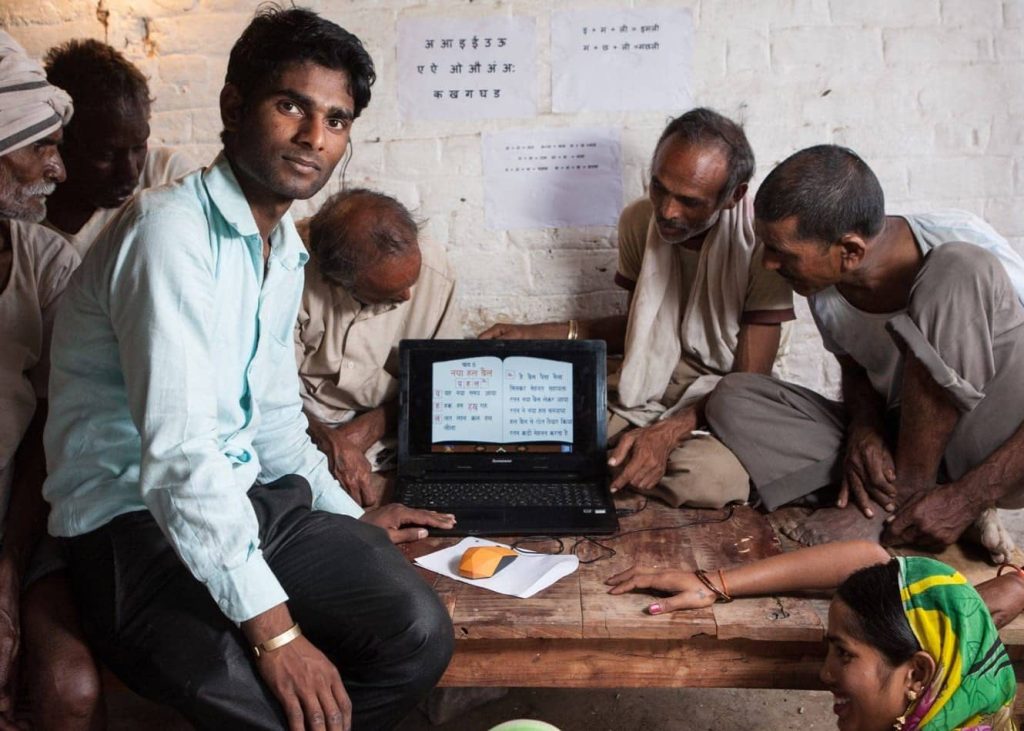
Launched in 2014, BridgeIT has a footprint across 30 districts in 10 states. The programme offers budding entrepreneurs the skills, mentoring, technology, tools and resources required to set up a Digital Service Centre from where they can provide services such as generating and updating documents (such as Aadhar cards, Pan cards, and voters ID), enrolling for different government schemes, filling in online forms and cash withdrawals/deposits from the bank to fellow villagers.
Digital entrepreneurs trained under TCS’ programme ‘BridgeIT’ are earning their livelihood across 1735 villages in India. The program is being expanded to 44 districts with a new cohort of 1400 women entrepreneurs from socially marginalized backgrounds.
Youth Employment Programme (YEP)
YEP tackles one of the biggest challenges in India – unemployment among youth, especially those from marginalized sections of society, due to lack of 21st century skills. YEP provides employability training, imparting skills such as business communication, aptitude, computer programming and domain skills with the help of subject matter experts, domain leaders, and certified trainers from TCS.

The programme offers participants a smooth transition from college to careers, building their confidence and enhancing their social and economic status through its unique teach, coach, mentor, and place model. It helps them navigate opportunities available in the Indian job market with career guidance and mentoring, training on interview skills and access to market-facing certifications and hands-on real-time project experience.
Since its inception, the programme has improved the economic and social status of the beneficiaries and their families, encouraged diversity and gender parity within the workforce while creating inclusion and access for marginalized groups across the country.
TCS’ Youth Employment Program currently runs in 24 states and union territories of India. In Financial Year 2024, 19,900 students were trained of which 49% for women. Over 2845 students have gained employment in the IT/ITES and other domains.
Social Innovation
Digital Impact Square (DISQ) is a social innovation platform established in 2015 in Nashik, Maharashtra. The platform encourages innovation among young employees who harness the power of digital technology and engage with the digital ecosystem, to develop solutions for a lasting change in society.
Since its founding, DISQ has worked with 7 cohorts with more than 600 innovators, 35% of who are female. These innovators hail from 22 states and from over 180 colleges across India.
Digital Impact Square (DiSQ) encourages innovation using
digital technologies to address social challenges and has
impacted 190,543 lives across various startups in FY 2024.
Employee Engagement
Through its unique engagement model, TCS leverages its intellectual capability, technology expertise, large employee base volunteering their time and skills and of course financial capacity to invest in programs that deliver longer term social impact across the globe.
‘Each one Empowers one’ portal
In August 2022, TCS launched the ‘Each one Empowers one’ portal which allows employees of TCS and Tata Group, along with their families, to empower non-literates in their local community, such as security guards, domestic workers and gardeners.
The programme aims at promoting social inclusion, financial stability and economic growth. It has helped beneficiaries to receive better access to government benefit programmes, financial systems and empowered them to have a more significant say in family and community decision-making.
#millionhoursofpurpose
In the FY 2023, TCS launched the civic movement #millionhoursofpurpose. The initiative encourages employees to support different causes. Through this, TCS employees have created positive impact in several ways like addressing the 17 UN SDGs, ranging from planting saplings and trees, making and distributing newspaper bags, raising mental health awareness and educating children in schools among others. TCSers also contribute to the Tata group’s volunteering initiatives twice a year, such as Tata Volunteering Week and Pro-Engage (long-term pro bono volunteering).
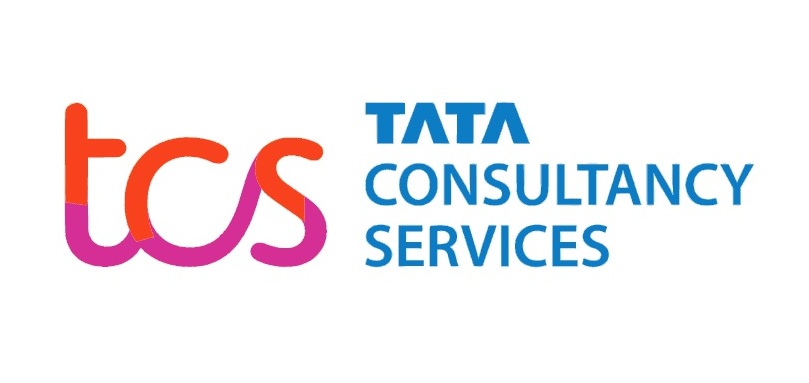
Conclusion
As per TCS’ Integrated Annual Report for the FY 2023-24, the company has spent a total amount o Rs 827 crore towards CSR which is little less than the two percent of average net profit of the Company as per sub-section (5) of section 135: Rs 850 crore.
TCS in India has a massive STEM education and skilling legacy. The IT major plays on its strengths while designing CSR programmes. This has led to a high success rate and life-changing benefits for the participants. It is doing a commendable job towards CSR in healthcare with a focus on cancer care.
Rising Trend of Mental Wellness Among Corporates
According to figures released by the World Health Organisation (WHO) in July, 60 to 70 million people in India suffer from common and severe mental disorders. However, numerous hurdles are standing in the way of addressing the situation.
Aside from the fact that the ratio of psychiatrists (0.3), psychologists (0.07) and social workers (0.07) per 100 000 people is woefully low compared to the ratio of psychiatrists in developed countries (6.6 per 100 000), stigmatisation of those battling mental disorders continues unabated.
It is no secret that India’s economy is surging ahead, with McKinsey & Co. reporting the government has set a target of growing the country’s GDP to $ 19 trillion by 2047, creating 600 million jobs in the process.
However, there remains extreme reluctance to disclose anxiety, depression and other mental conditions at work.
Upton, celebrated for the role he has played in creating a winning mindset among Indian sports teams, has also enjoyed considerable success in the corporate sector, where all too often he sees the negative effects “outdated dictators” lacking emotional intelligence have on staff.
Behaviour of Leadership
In cases where leaders’ behaviour becomes overbearing, employees’ mental health declines to the point that they suffer breakdowns and may even be forced to leave the business.
“When somebody is placed under too much stress, they are either forced to leave through illness, they leave voluntarily, or they mentally check out and simply go to work to tick a box, get the paycheck, and not get into trouble. In all three situations, productivity and culture take a significant nosedive,” Upton says.
The “Insights from India’s Best Workplaces in Health and Wellness 2023” report, released earlier this year, surveyed thousands of Indian employees from over 210 organisations and established that a quarter of all workers struggle to voice mental health issues for fear of judgment.
Upton says it has become imperative for organisations to have mental support measures to help people constantly stressed over deadlines and meeting targets, particularly those in major Indian industries like IT and finance.
He is pleased to note, however, that organisations are starting to move away from the era where autocratic leaders were widely celebrated.
“We are recognising the power-hungry authoritarians for who and what they are, and I think that’s one of the reasons why the stigma is changing. Now, you have more emotionally mature, respected leaders saying, “Mental well-being is important; let me lead to help alleviate rather than worsen it.”
He says many older-generation business leaders have failed to embrace the fact that the knowledge that was once exclusively theirs is now freely available on the Internet. This has meant their authority has been greatly diminished, and they will have to learn to work with rather than laud over employees.
Much of the change comes from leaders with good heads, big hearts, and the backbone (courage) to connect the two. One of their great attributes within the business context is putting employees in the best possible mind space to be fully present in their work.
Engaged employees who are invested in their work bring their best thinking and problem-solving capabilities instead of only being physically present or on “autopilot” from a mental perspective.
Upton’s reputation as a sports mentor precedes him, having helped India win the 50-over ICC Cricket World Cup in 2011 and most recently, guide the men’s hockey team to the semifinals of the Paris Olympics.
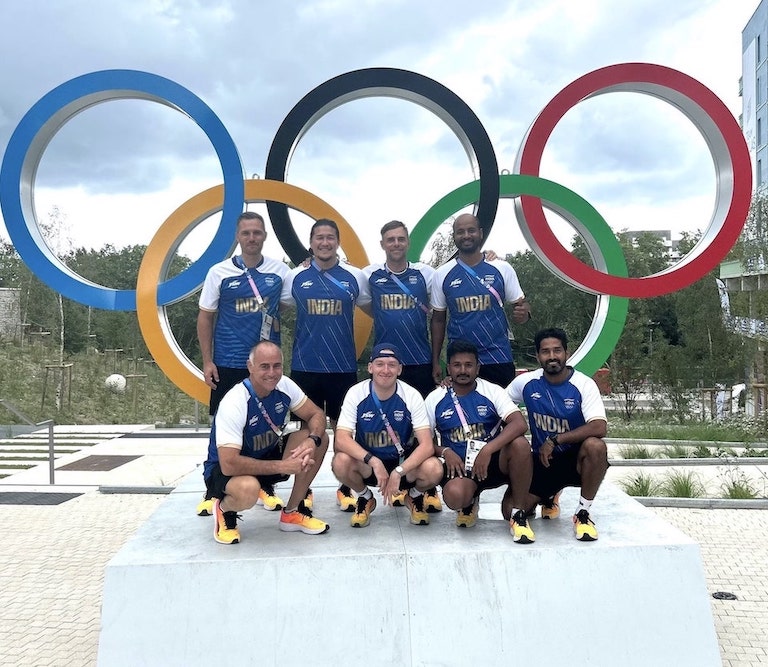
(Front left to right): Paddy Upton, Artur Lucas, Arup Naskar, Shivendra Singh
Hailed by professional cricketers as one of the great coaches of the modern era, he is known for instilling clarity of vision in those who find themselves in pressure situations, be they in the sporting or business arena.

(Left to right): Paddy Upton, PR Sreejesh, Krishan Pathak



